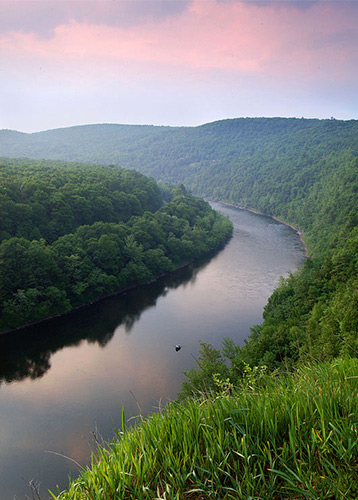Litigation: Delaware Riverkeeper Network, et. al. v. Federal Energy Regulatory Commission, Tennessee Gas Pipeline Company
Federal Court Rules FERC Violated Federal Law When Issued Approvals for NEUP Pipeline Project
update: FERC has failed to comply with the court's ruling and revisit its NEPA review of this project - DRN is pressing the issue with the court.
In a decision issued June 6, 2014, the United States Court of Appeals for the District of Columbia, ruled that the Delaware Riverkeeper Network, the NJ Sierra Club and New Jersey Highlands Coalition were correct in their legal challenge to the Tennessee Gas Pipeline Company’s Northeast Upgrade Project and ordered additional analysis and review. Delaware Riverkeeper Network's on staff attorneys were the lead in this legal action.
The Court stated:
“On the record before us, we hold that in conducting its environmental review of the Northeast Project without considering the other connected, closely related, and interdependent projects on the Eastern Leg, FERC impermissibly segmented the environmental review in violation of NEPA. We also find that FERC’s EA is deficient in its failure to include any meaningful analysis of the cumulative impacts of the upgrade projects. We therefore grant the petition for review and remand the case to the Commission for further consideration of segmentation and cumulative impacts.”
“On the record before us, we find that FERC acted arbitrarily in deciding to evaluate the environment effects of the Northeast Project independent of the other connected action on the Eastern Leg.”
In May 2012 the Federal Energy Regulatory Commission (FERC) issued a certificate of public convenience and necessity to Tennessee Gas Pipeline Company authorizing construction and operation of its Northeast Upgrade Project. Delaware Riverkeeper Network, the NJ Sierra Club and New Jersey Highlands Coalition argued that the approval was inappropriate because FERC had illegally segmented its environmental review of the Northeast Project by failing to consider three other connected and interdependent projects – the 300 Line Project, the Northeast Supply Diversification Project, the MPP Project – and by failing to provide a meaningful analysis of the cumulative impacts of the projects.
Maya van Rossum, the Delaware Riverkeeper said about the decision: “This is important vindication of the rights of our communities and environment to be honestly considered and protected by our federal agencies. FERC has been allowing illegal segmentation by pipeline companies for years, it has ignored the pleas of the public for equity and for honest review of impacts, and as such FERC has been complicit with the pipeline companies in their ongoing efforts to avoid the rule of law and to ignore the devastating impacts they are having on our environment, impacts that will harm not just present, but also future generations. It is rewarding that a federal court has finally held FERC to account.”
The case was argued before the Court of Appeals by Delaware Riverkeeper Network attorney Aaron Stemplewicz. Said Stemplewicz of the decision, “The D.C. Circuit’s decision today should put other pipeline companies on notice that the practice of segmenting pipeline projects before the Federal Energy Regulatory Commission will no longer be tolerated, and that the cumulative environmental impacts resulting from these projects must be fully considered before a project is approved.”
Added Delaware Riverkeeper Maya van Rossum: “This decision is important and powerful for every pipeline, related infrastructure and LNG project to come, but sadly for the communities, forests, streams, wetlands and critters impacted by the four projects at issue here, the decision comes too late to ensure their full consideration and protection. We will be able to press for important mitigation and efforts to undo the harms already inflicted, but as for avoiding the full array of harms, that is now impossible. FERC needed to do its job when it had the opportunity – but they were too busy servicing the gas pipeline companies to care.”
Of particular note – all three justices ruling on this case concurred on the final judgment rendered.




